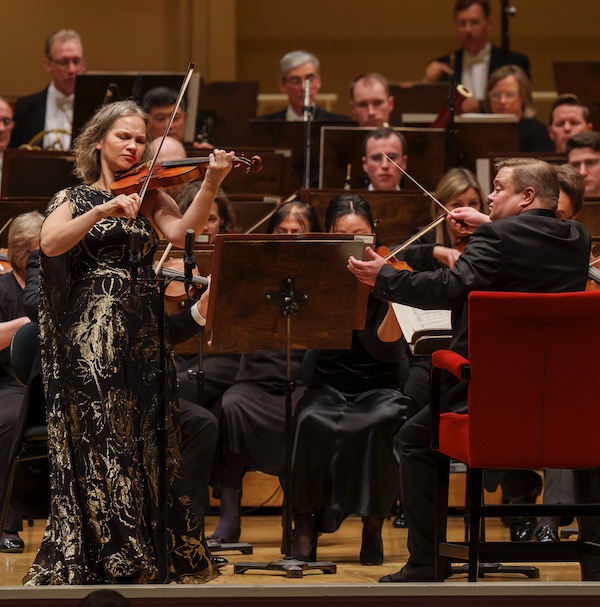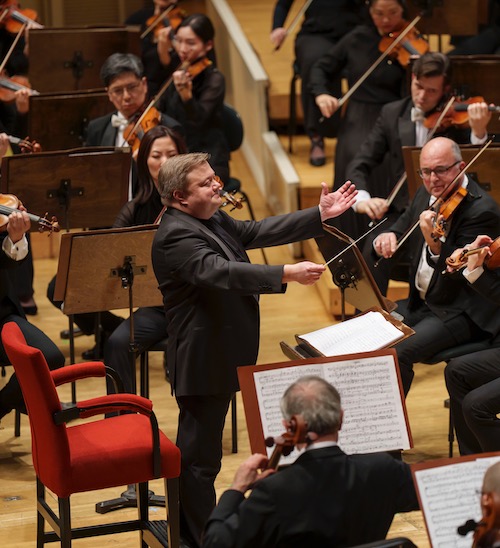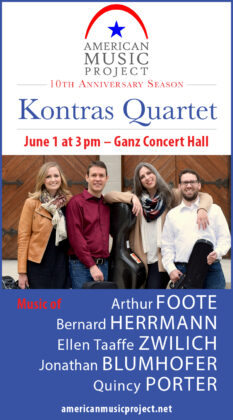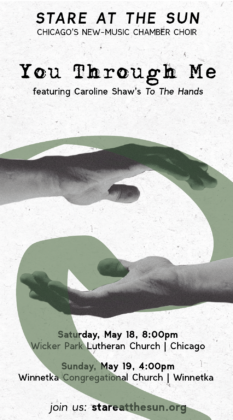Hahn returns to Chicago Symphony with fresh and individual Brahms

There is an old and venerable axiom in classical music marketing: “When in doubt, call it a festival.”
To its credit, the Chicago Symphony Orchestra is not calling the present cornucopia of Johannes Brahms’ music a festival, since it really isn’t one. And while the scheduling of so much Brahms in a few short weeks may have been wholly serendipitous, it has been providing local audiences with some inspired performances including two Brahms symphonies by the Staatskapelle Berlin and the CSO in Schoenberg’s jazzed-up retooling of the Piano Quartet in G minor. (Semyon Bychkov leads the CSO in the Fourth Symphony next week.)
The Brahms bacchanal continued Thursday night with Hilary Hahn performing the German composer’s not unknown Violin Concerto. All good things must come to an end and this is the final season of Hahn’s three-year run as CSO artist in residence. (She will return for a chamber event in June.)
The American violinist’s CSO-associated tenure has provided a boon to local audiences with the opportunity to hear one of the leading violinists of our day several times a season. Let’s hope that Hahn’s Chicago appearances stay as frequent in the future.
Her CSO collaborations have been consistently stellar and such was the case again Thursday night with the orchestra led by Hahn’s friend and regular collaborator Mikko Franck.
Twenty years ago near the start of her career, Hahn made a recording of the Brahms concerto (Sony) that was notable for a kind of classical purity of expression. Thursday night’s performance had that refinement but was balanced by a greater and more bracing dramatic fire.
With Franck a simpatico partner, the opening movement was launched with an ardent and rhapsodic orchestral introduction. The soloist immediately commanded attention with her arresting entrance and Hahn’s gleaming tone remained a consistent pleasure throughout. Her playing brought firm dramatic cut yet drew out lyrical passages with a tender, searching expression.
The Baltimore native’s unique artistry manages to bring freshness and individuality to every performance, even in a warhorse like the Brahms. Hahn made a mini-tone poem out of the first-movement cadenza: widely terraced dynamics, thoughtful phrasing and offbeat emphases—which sounded so novel that one momentarily thought she had dispensed with the familiar Joachim cadenza in favor of a solo by another hand.
The Adagio opened, jarringly, with a loud and blandly played oboe solo, which was neither piano nor dolce as marked, a rare misfire from the orchestra’s usually nonpareil principal, William Welter. Hahn was unfazed, entering with refined tone and a poised, inward expression, continuing in that gently ruminative vein. One could go a lifetime without hearing this music as beautifully played nor rendered with such tonal sensitivity.
The finale was perhaps less individual but delivered the fiddle fireworks with easy brilliance, Hahn’s playful bravura smartly partnered to the focused accompaniment of Franck and the orchestra.
The soloist’s encore brought, not Bach, but Steven Banks’ Through My Mother’s Eyes, a CSO commission which Hahn premiered last April. The violinist fluently charted the segue from light virtuosity to elegiac consolation.

The second half of the evening brought music of Wagner and Sibelius, and the focus shifted to conductor Franck, who was making his first CSO podium stand in 19 years after cancelling three out of five scheduled appearances due to various illnesses.
Except there was no podium. Rather, there was a red chair—apparently repurposed from the hall’s box seating—placed flat on the stage floor. Franck largely conducted standing, sometimes walking a few steps over to the musicians’ stands for closer emphasis. He would sit down for a few seconds, and then get up to direct the music standing for several bars before sitting again and repeating the cycle. Unorthodox to be sure, but Franck’s restive, energetic presence and concentrated direction—leading vigorously with high, sweeping gestures—largely elicited responsive playing.
In the Prelude to Tristan und Isolde, Franck’s lean, technocratic approach was the antithesis of traditional Wagnerians like, say, Daniel Barenboim. From the hushed opening for cellos, Franck led a spacious, airy account shorn of rhetorical excess. As if reduced to musical essentials Wagner’s ground-breaking music went with a flowing simplicity and natural eloquence, aided by the musicians’ sensitive wind playing. Franck had the cello section stand to be recognized en masse for their contribution.
Jean Sibelius’ Symphony No. 7 was his last and, for many, his greatest work in the genre. Here, the Finnish master pares down traditional symphonic structure to a tightly wrought single movement of 20 minutes. Yet nothing is lacking and even in its concision the Seventh is a varied work of extraordinary eloquence and taut, elemental power.
It’s almost a given that Finnish conductors have a way with music of their most celebrated compatriot. Certainly that has been the case locally with memorable performances led by Susanna Mälkki and Esa-Pekka Salonen, who conducted the CSO’s last performance of Sibelius’s Seventh a decade ago.
There were quality moments in Thursday night’s Sibelius—the strings’ wind-driven Northern tempest and the scherzo-like section, which conveyed an inimitable atmosphere of bucolic nature and cool streams.
Yet ultimately this Sibelius performance proved unsatisfying. Franck’s deconstructionist approach was less successful here, too often sacrificing the score’s dramatic richness and sonorous impact. The conductor repeatedly held down the brass, fatally so in the crucial trombone theme, which robbed the music of its craggy grandeur and majestic inevitability.
The program will be repeated 1:30 p.m. Friday and 7:30 p.m. Saturday. cso.org
Posted in Performances




Posted Dec 08, 2023 at 12:51 pm by Brad
Spot on! For me, a largely wonderful first half proceeded to a second half that felt rushed and unfeeling. The Sibelius 7 in particular, a piece I love, was ruined by the things you mentioned. That beautiful trombone theme for example, which sounds radiant in some of the best recordings and performances, was obliterated in this concert. It sounded coarse, weak, and rather out of tune as well.
As for the conductor’s strange setup, I wish he had just stayed seated if he couldn’t remain standing. I found the constant up and down distracting and annoying. Glad he seems to be in pretty good health though and I hope the issues are largely behind him now.
Posted Dec 10, 2023 at 1:42 pm by Joseph
Hahn played so well balanced and insightful on Saturday, it was an absolute highlight in over 30 years of concert-going. What a joy she is.
I thought Franck’s biggest failing in the Sibelius was uneven dynamics between sections. Lush strings too often lost under horns. A work that really demands rigorous shaping from the conductor seems to unfold rather arbitrarily. Unfortunate cap to an otherwise great night of music.